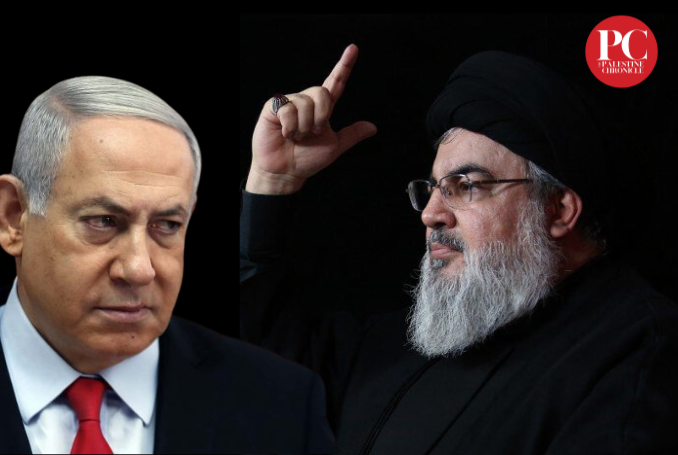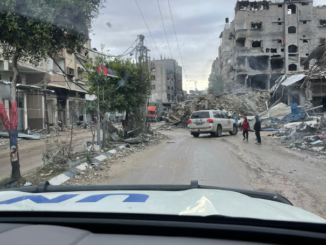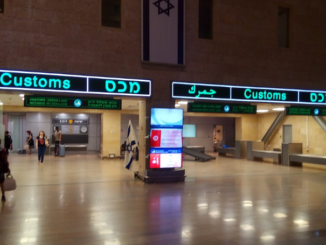
By Palestine Chronicle Editors
Has Hezbollah, in its latest attack on Israel, managed to restore deterrence, thus denying Israel any strategic achievement following the assassination of top Hezbollah commander Fouad Shukr on July 30?
In his speech, hours following the Hezbollah retaliation against Israel on Sunday, the movement’s leader, Hassan Nasrallah, said that the group has “targeted sites and barracks to exhaust the Iron Dome and its interceptive missiles, allowing drones to reach their targets.”
“We identified a set of targets near Tel Aviv that meet our specifications, including the Glilot base, which is a central base for Israeli intelligence and houses Unit 8200,” Nasrallah added.
“Our data confirms that a significant number of drones reached these targets, but the enemy is concealing the facts. However, the coming days and nights will reveal the truth of what happened there”.
On that same night, Abu Obeida, the spokesperson for the Al-Qassam Brigades, the military wing of Hamas, congratulated Hezbollah for its “initial response operation” and emphasized that Hezbollah’s operation demonstrates a significant shift in the strategic landscape for Israel since the start of the Al-Aqsa Flood.
‘Day of Arbaeen’- Nasrallah Reveals Hezbollah’s Main Targets, Denies Israel’s Allegations
“The enemy has no safety from retribution, and there are no limits to the possibility of striking it anywhere and from any front,” Abu Obeida said.
Despite all of this, some voices, including many anti-Hezbollah Arab analysts, doubted the effectiveness of Hezbollah’s retaliation.
As far as the Israeli government is concerned, the Hezbollah attack, using 340 rockets and multiple drones, was useless.
“I can confirm that there were no hits at the Glilot base,” a spokesperson for the Israeli military said.
Judging by the experience of the last ten months, the Israeli army and its spokespersons have little credibility, as they constantly undermine the damage, in both military equipment and personnel, inflicted by the Resistance, despite the fact that the latter documents most of its attacks using videos and other means.
Indeed, while Palestinian Resistance in Gaza documents many of its operations, Hezbollah uses highly precise monitoring equipment to authenticate its accounts regarding its ongoing resistance in south Lebanon and at Israel’s northern borders.
All of this in mind, an important question must be asked: has Hezbollah, in its latest attack on Israel, managed to restore deterrence, thus denying Israel any strategic achievement following the assassination of top Hezbollah commander Fouad Shukr on July 30?
‘All Fronts Will Remain Ablaze’ – Resistance Roundup – Day 324
Revisiting ‘Deterrence’
On October 6, 2023, the rules of engagement that governed the relation between Israel and the Lebanese resistance were predicated on Israel’s military presence across all border regions, and active Israeli military operations in the occupied areas of south Lebanon as well.
This equation also allowed Israel to operate unhindered above the Lebanese skies, often breaking the sound barrier over Lebanon while conducting aerial operations and bombings over Syria.
Those ‘rules’ were themselves the outcome of the 2006 Israeli war on Lebanon, where Israel failed to occupy parts of the south of the country with the hope of pushing Lebanese resistance north of the Litani River.
It can be argued that the Lebanese, Palestinians, and their allies are justified in describing the outcome of that war as an outright defeat for Israel. That defeat, however, still did not change the relationship between the two sides in a way that would allow Lebanon to retrieve its occupied territories or discourage Israel from habitually violating Lebanese sovereignty.
Ten months into the war, the nature of the relationship seems to have been fundamentally altered. Both sides have pushed toward the creation of new rules of engagement, thus raising the serious possibility of an all-out war.
This leads to another question: who has the upper hand in these new rules of engagement?
Transparency and Denial
Israel is known for either denying or undermining its military losses on both the Gaza and the Lebanese fronts.
Hezbollah, however, has been transparent about its own losses whether among civilians or military personnel.
When Israel assassinated Hezbollah commander Fouad Shukr in south Beirut, it also killed a number of civilians.
Though Hezbollah could have used the killing of civilians to justify future retaliatory attacks against Israeli military bases, it, within hours, declared that indeed, its top commander had been assassinated.
The group could have hidden the news of the murder of its commander, simply because very few, whether in Lebanon or outside, knew of the man’s identity.
‘Slap in the face’ – Israel Censors News of Damage from Hezbollah Attacks
Indeed, Shukr’s identity was so well protected to the extent that, for days after his assassination, news networks in the Middle East continued to share the wrong photo of the man. Only when Hezbollah published Shukr’s actual photo, did we become familiar with the man’s actual appearance.
The reason why Hezbollah declared the death of its top commander was indicative of the group’s immediate desire to avenge him, thus to, once more, establish new rules of deterrence and change the old rules of the game altogether.
In many ways, this reflects the Lebanese resistance’s growing confidence in its ability to match the Israeli escalation with even greater escalation, denying Tel Aviv any kind of political leverage or victory in Lebanon – as the Gaza resistance has denied Israel victory in the Strip as well.
For nearly a month, Hezbollah repeated that the response would be stronger than anything that Israel had expected, raising panic in Israel, a state of emergency throughout the military, and long lines of customers hoping to store needed food supplies as they remained inside or close to their bomb shelters.
That collective psychological impact was only part of the retaliation. It was followed by a massive volley of rockets and drones that reached many parts of Israel, including the Meron Base, the Negev Ziv Artillery Position, the Zaoura Artillery Position, the Ramot Naftali Barracks, among others.
The Hezbollah attack also included a “sensitive target”, which turned out to be the Glilot military base, where the army’s 8200 intelligence unit is headquartered.
Again, Israel denied that any serious damage had happened to this base or any other.
Instead, Israel said that it had struck hundreds of Lebanese targets preemptively, destroying thousands of rockets and preventing the Hezbollah attack from being much worse.
What can we learn from the Israeli claims?
‘Initial Response’ – Hezbollah Launches Drones, Israel Strikes Southern Lebanon
Avoiding Escalation
While Hezbollah used the assassination of Shukr as a way to showcase its power and outreach, Israel constantly undermined the importance of Hezbollah’s responses to avoid further escalation.
This implies that what Israeli Prime Minister Benjamin Netanyahu is hoping for is an escalation that would lead to a regional war, which would involve the US, not a limited war between Israel and Hezbollah.
Israel knows that it is unable to fight a war against Hezbollah alone, and, unlike the outcome of the 2006 war, the outcome of a future war with Lebanon would be much more destructive for Israel.
As for the ‘preemptive strike’, one does not need to consult with Nasrallah’s statement that “Many valleys that the enemy considers to contain ballistic missile platforms and installations (…) were empty or already evacuated areas.”
We know for a fact that Israel cannot possibly know the location of Hezbollah’s rocket arsenals, simply because the group’s military capabilities are in constant movement.
Additionally, we also know, per Israel’s own claims, that the Israeli army has been informed – most likely by the US – that Hezbollah is preparing a response, only a short time before the response had in fact begun.
Hezbollah Secretary-General: We heard the version of the enemy. They changed the narrative in the afternoon. Their version is full of lies. Hezbollah's goal was not to target Tel Aviv or civilian targets in the north. These are false allegations. All the missiles targeted… pic.twitter.com/tzsTElSmix
— The Palestine Chronicle (@PalestineChron) August 25, 2024
How is it possible that Israel, within a matter of minutes, managed to acquire extensive details of Hezbollah’s moving positions, thus striking them down with great accuracy, as the Israelis claim? Obviously, the Israeli strikes were carried out for propaganda purposes, to convey a sense of confidence in its beleaguered military, nothing more.
Thus, by exaggerating the effectiveness of its supposed ‘preemptive strike’, while completely denying any damage inflicted by Hezbollah, Israel has conveyed the exact opposite: weakness, not strength.
Weakness because the Israeli narrative seems to have been perfectly tailored to avoid any further escalation, thus once more, giving Hezbollah the last word and the upper hand.
While the Israeli government of Benjamin Netanyahu is now busy celebrating the re-establishment of the so-called deterrence on the northern front, the Israeli military, many in the media and political analysts as well, know that the opposite is true.
It is Israel that has lost its deterrence in Lebanon, and if things continue to move from bad to worse for the Israeli army, this time may be forever.
(The Palestine Chronicle)









The resistance must continue with weakening the Zionists as if not they will continue their death cult hegemony and no humanity can allow that to happen. It has to be done or it will be a victory for these Nazi blooddrinkers.